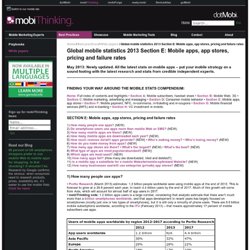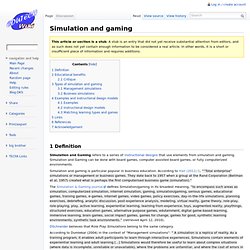

Usage Statistics. Mobile Use Grows 115% in 2013, Propelled by Messaging Apps Posted by Simon Khalaf on Mon, Jan 13, 2014 In November 2013, Benedict Evans, a well-respected and widely followed analyst, shared an updated version of his famous slide deck called “Mobile is Eating the World”.

This deck quickly made the rounds on social media and was highly referenced by industry and financial analysts who cover mobile. We can’t help but agree with Benedict’s conclusion. For the past five years, we have watched mobile disrupt every industry, in every country, and continue to break its own records year after year. 2013 did not disappoint. According to Flurry Analytics, overall app use in 2013 posted 115% year-over-year growth.
Every single app category has shown growth over the last twelve months. However, the segment that showed the most dramatic growth in 2013 was Messaging (Social and Photo sharing included). Killer Apps or Killer Platform? Another explosive growth year in mobile has passed. The App World. Global mobile statistics 2013 Section E: Mobile apps, app stores, pricing and failure rates. Home: Full index of contents and highlights • Section A: Mobile subscribers; handset share • Section B: Mobile Web; 3G • Section C: Mobile marketing, advertising and messaging • Section D: Consumer mobile behavior • Section E: Mobile apps, app stores • Section F: Mobile payment, NFC, m-commerce, m-ticketing and m-coupons • Section G: Mobile financial services (MFS) and m-banking • Section H: VC investment in mobile.

SECTION E: Mobile apps, app stores, pricing and failure rates 1) How many people use apps? (NEW) 2) Do smartphone users use apps more than mobile Web or SMS? (NEW). 3) How many mobile apps are there? (NEW) 4) How many mobile apps are downloaded each year? 1) How many people use apps? • Portio Research (March 2013) estimates: 1.2 billion people worldwide were using mobile apps at the end of 2012. Result List: Karl Kapp: EBSCOhost. Gamification In Learning. Top 100 Learning Game Resources. Education. Home of everything Gamification Education -- research, community, case studies and more -- as part of the Gamification.org family of wikis.

Want to help us create this website? Contact us! Introduction Education affects everyone. It's how humans learn both explicit material (facts, dates, formulas, methods) and implicit material (critical thinking, attitudes, judgement). Instructor-ledComputer-based Instructor-Led Instructor-led teaching does not always have to be in a formal classroom setting. The benefits of an instructor-led teaching is that it is very interactive. The downside of instructor led teaching is that the effectiveness of this medium depends totally on the instructor. Payments to be made to a person to come to a meeting place and speak on a topicEmployees need to take time off to attend the courseTransport and accommodation may need to be arranged for employees Computer-based The benefits of computer based training are that it is cheap and people can do it at their own time.
Games in Education: Gamification - Games in Education: Gamification - OpenLearning. The Gamification of Education Infographic #gamification #edtech. Gamification in Education: What, How, Why Bother? MIT STEP. Category:Microworlds. MARC PRENSKY Motivational Speaker + Author. Www.marcprensky.com/writing/Prensky - Types of Learning and Possible Game Styles.pdf. Simulation and gaming. This article or section is a stub.

A stub is an entry that did not yet receive substantial attention from editors, and as such does not yet contain enough information to be considered a real article. In other words, it is a short or insufficient piece of information and requires additions. 1 Definition Simulation and Gaming refers to a series of instructional designs that use elements from simulation and gaming. Simulation and Gaming can be done with board games, computer assisted board games, or fully computerized environments. Simulation and gaming is particular popular in business education.
DSchneider believes that Role Play Simulations belong to the same category According to Dumlekar (2004) in the context of "Management simulations": “ A simulation is a replica of reality. See also: Computer game, video game, microworld, tangible computing, simulation. 2 Educational benefits According to Dukes (in the context of sociology teaching): They increase student motivation. 2.1 Critique 5 Links.